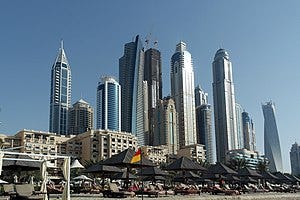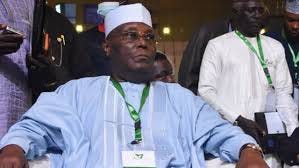2023 Presidency and The Creative industry
What the Creative Brief is concerned with is how well do these intentions resonate with creatives and the influencer economy.

As the 2023 general elections come closer, the race for the most coveted seat in Nigeria gets more intriguing. This is coming as three major candidates have thrown themselves forward, in a bid to go all out for the win. The three candidates are Peter Obi representing the Labour Party, Bola Tinubu representing the All Progressive Congress (APC) and Atiku Abubakar representing the Peoples' Democratic Party (PDP).
In their various speeches and campaigns which are still ongoing, they have trudged the length and breadth of Nigeria, spreading their messages in how they hope to transform the country. However, what the Creative Brief is concerned with is how well do these intentions resonate with creatives and the influencer economy.
It was just last year on June 4th, 2021 that Twitter was banned by the incumbent president, Muhammadu Buhari till January 13, 2022. The seven month ban period killed the business of endorsements for many influencers in that period. Many lamented a loss of enterprise and were forced to manage living during that painful period. The most affected were creatives in Nigeria using Twitter.
This piece would assess the presidential candidates as regards their manifestos ahead of the new electoral season which may most likely affect creatives for another set of eight years.
Bola Tinubu
For Bola Tinubu, his renewed hope manifesto draws many similarities to M.K.O's Abiola's plan of 1993. Its cardinal scope borders on security, economy and continuation of Buhari's policies. It is right to reminisce on how some of Buhari's policies have adversely affected creatives. Some of them include the clampdown of cryptocurrency, difficulty in making dollar payments and limit to $20; Twitter ban; and lack of support for creatives in terms of grants; jailing and blocking the account of influencers, as regards parody done online.
Tinubu nonetheless promises to prioritize the development of the creative sector via the use of the fourth industrial revolution. He also promises one million jobs in Information and Communication Technology (ICT) within 24 months. That seems quite impossible with a youth unemployment of over 30%, however, Tinubu promises such.
Under the Sport, Entertainment and Culture aspect of his manifesto, he notes that the creative industry is one of the fastest growing sectors and pledges support for Nollywood and Kannywood, as well as music industries. He doesn't dwell on the work of nano, or micro influencers who are the majority of the influencers on Nigeria's social media whether via TikTok, Instagram, Twitter and possibly Snapchat. YouTubers are not also considered, though filmmakers can also cover as a term for all filmmakers- Indie or major distributors.
What is indeed attractive is the establishment of a Media City which will be used as a means to support the creative sector and attract foreign investment. There is mention of a tax regime which, though might be subsidized, shouldn't even occur in that Media City because such an initiative should not go through the hurdles of taxation with the several tax regimes Nigeria already has.
West Africa Tax Leader at PricewaterhouseCoopers (PwC), Taiwo Oyedele, once flayed the President Muhammadu Buhari administration for imposing multiple taxes on Nigerians. He tagged the ninth National Assembly of Nigeria (NASS) as “insensitive.”
Already, the Buhari administration had introduced six new taxes. They are the Companies Income Tax (CIT), Tertiary Education Tax (TET), National Information Technology Development Agency (NITDA), Police Trust Fund Levy, National Agency for Science and Engineering Infrastructure (NASENI) levy and the NYSC levy.
Tinubu however promised to upgrade existing entertainment venues and stadia across the country to world-class standards while inaugurating a Presidential Creative Industry Advisory Team to help the industry flourish.
Atiku Abubakar
Before getting into his manifesto, Atiku has always had a knack for creatives. This is a frank analysis of his moves. At least twice this year, if not even three times, Atiku had pledged to help creatives. On September 19, 2022, Atiku met with Former Big Brother Naija housemates, Cross Ike popularly known as Cross, and Chemeka Okoye, popularly known as Frodd. They were not the only ones, in a popular video circulated by Atiku's Official Twitter account and a few others at the event, Atiku was all smiles meeting them.
He did the same thing on November 27, 2022 where he vowed to support Nigeria's creative industry if elected into power in 2023.
“This industry is a livewire for our economy. A sector that provides employment, especially for the youths, is not one to be toyed with. This sector can provide us huge revenue if well harnessed. “The way forward is to increase funds for the arts and liberalise the process of acquiring that fund, if you give me the opportunity, I will do it because it is essential," he was quoted to have said.
This was a similar case at the 2022 edition of the Private Sector Economic Forum for the 2023 presidential election, organised by the Lagos Chamber of Commerce and Industry (LCCI).
In his manifesto titled, "My covenant with Nigerians," he dwelt on five cardinal points, stressing the importance of a working economy. Choosing to absolve himself from APC's blame game, he presented himself as an experienced politician with the right catalyst for Nigeria's monumental growth.
The five points involve unity, safety, economic prosperity, restructuring, and equitable education. For some reason, Atiku focused more on economic indices of wealth, production, industrialization, allowing the market greater leverage in determining prices. He didn't specifically highlight how creatives may benefit from his manifesto, but he explained in great detail how the economy would be determined, which can be classified as a big win for all.
3 million new jobs, 10 million poor lifted out of poverty annually- was a standout point. If ICT, good education, incubators, fiscal policies and small and medium business directly translates to influencers and creators, maybe we can say Atiku's manifestoes took creatives into account. But the former vice president failed to bring his policies down to the individual or a creative. Sometimes, plans can be made but it doesn't trickle down. However, if a good economy, ICT and power is provided, that may help boost creativity.
Peter Obi
Out of Peter Obi's 7 points in his "Our Pact with Nigerians" manifesto; number six is very clear. It read thus: “Enhance the human capital of Nigerian youths for productivity and global competitiveness through investment in world-class scholarship and research, quality healthcare, and entrepreneurship education."
In all honesty, Obi's manifesto is quite emotional in the way he transfers power to the people while he assumes the position of a servant in his ideals. His manifesto is poised to address youthful concerns and diversity in the country. He notes that he will "strengthen the incentive regimes for new growth industries, in particular, the culture and creative industry, and technology-oriented industries."
This involves the development of youths, entertainment, tech and industries that enable the growth of the industry. Obi's manifesto for creatives is vivid, straight to the point and precise. Above all, it is broad enough to accommodate all other parts of the creative economy that he may not wholly understand.
It is clear to admit that each of the three major candidates are aware of the creative sector. It differs plan to plan and depth to depth, however the choice for creatives is in their hands as they head to the polls next year.










